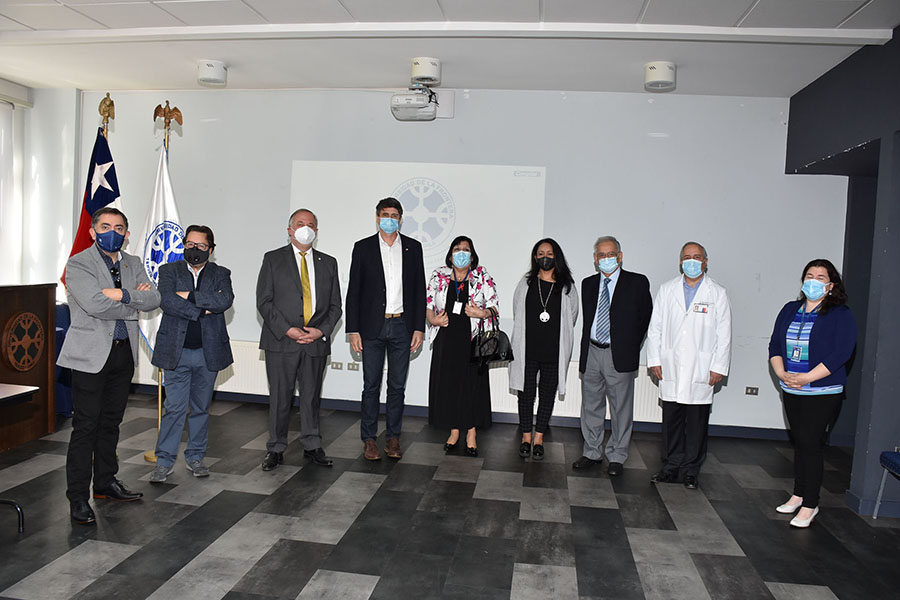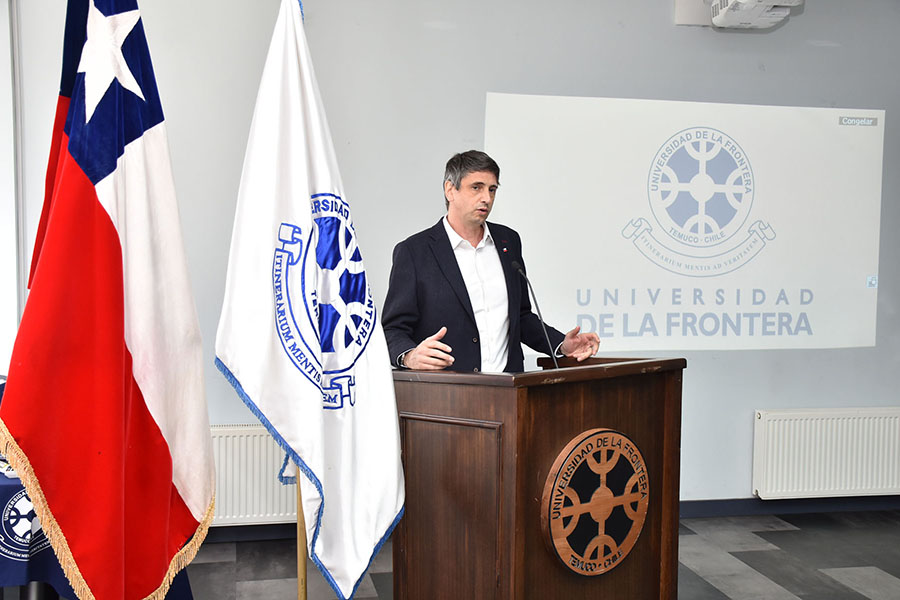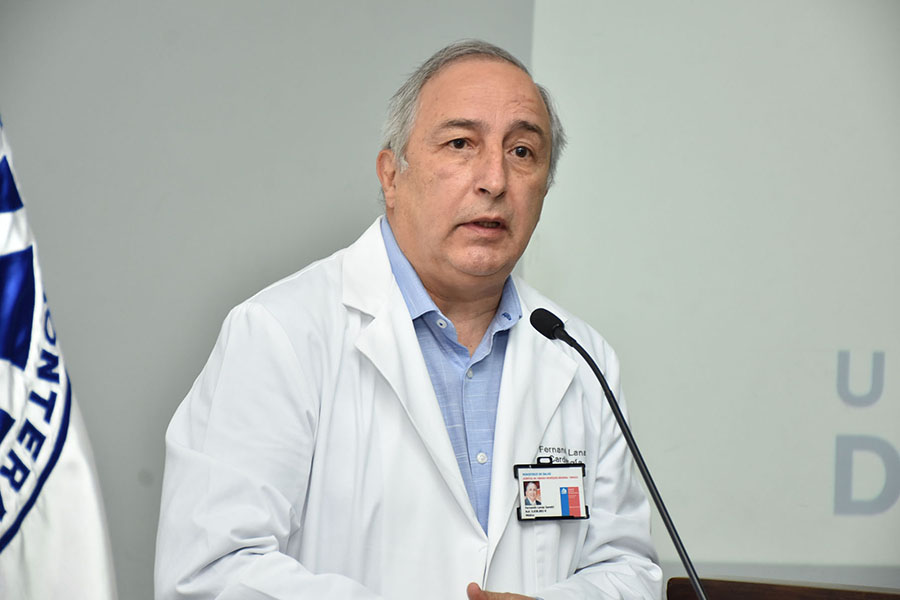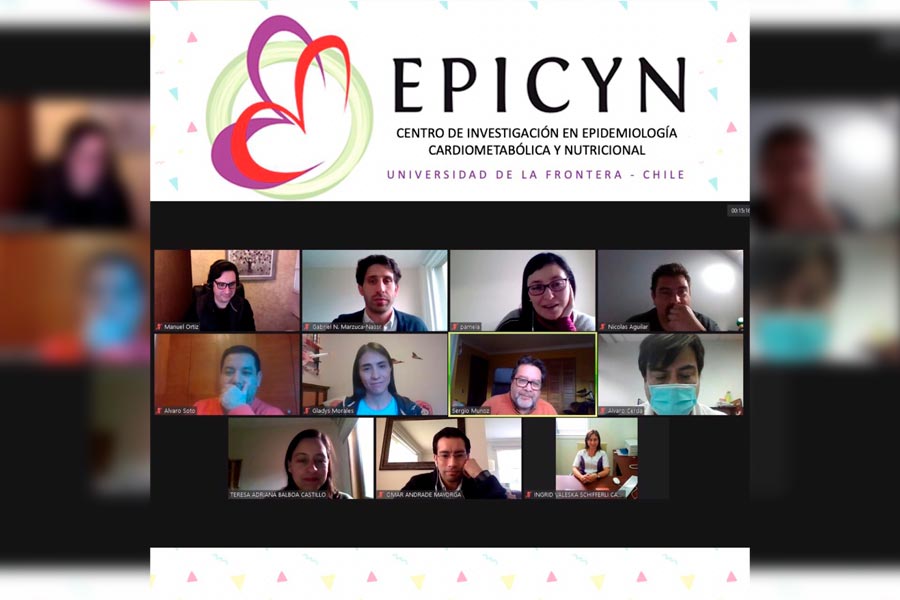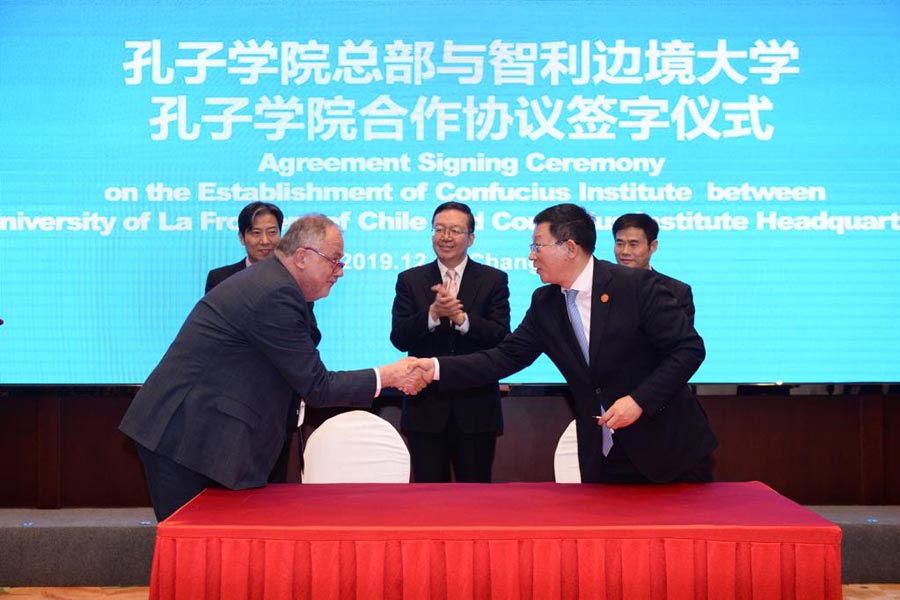Minister of Science visited UFRO and stressed the leadership in clinical trials for Covid-19 vaccine
|
The Minister Andrés Couve met with the university authorities and researchers who are leading the clinical trial for CanSino Biologics’ Covid-19 vaccine. |
“This clinical trial for a vaccine is one more example that it is possible to work on scientific discoveries for Chile and the world on the regional level in a rather centralized country such as Chile,” Andrés Couve, the Chilean Minister of Science, Technology, Knowledge and Innovation, pointed out during his visit at the university Universidad de La Frontera (UFRO), which is the only institution in phase III of the clinical trial for CanSino Biologics’ Covid-19 vaccine. The purpose of this meeting was to get to know the details of this clinical trial. Therefore, the Minister Andrés Couve met with authorities of UFRO and the regional government, with the academic staff that coordinates the study and with volunteers who have decided to be part of it. Some of the attendees were the Rector, Dr. Eduardo Hebel; the regional Health Minister, Dr. Gloria Rodríguez; the Vice-rector of Research and Graduate Studies, Dr. César Arriagada; the Dean of the Faculty of Medicine, Dr. Wilfried Diener; the Research Director, Dr. Pamela Serón; and Dr. Fernando Lanas, the researcher who is leading this study together with Dr. Sergio Muñoz, both of UFROs Faculty of Medicine. According to Dr. Eduardo Hebel, because of the impact of this pandemic, the whole world is watching and waiting for the results of these clinical trials for a vaccine that will help to protect the world population. In this context, he stressed that “we are very proud that our university in the south of Chile has been chosen to lead this study, which can benefit people in the whole world. This certainly is a recognition of our scientific work”. In this context, the Minister pointed out that “the regional institutions offer different opportunities and we have to combine all advantages in order to create the best service for our country, and we believe that regional research should be developed with this in mind”. He also explained that after the approval by the regulatory authorities, “these vaccines will meet the highest safety and efficacy criteria, so that the people do not have to worry. We need to be vaccinated as a society. Immunization is not an individual issue, we all have to play our part in the fight against this virus and to protect each other”. Dr. Fernando Lanas also stressed the fact that Chile is part of these major global studies and that a Chilean regional university is coordinating one of them. “This is a tremendous contribution in terms of our research capabilities and our scientific output. This is the only study led by a regional university, and a challenge and source of pride for us,” he said. The researcher explained that this vaccine uses an adenovirus that cannot replicate and that carries the coronavirus protein on its surface. The results of phase I and II have already been published and show that it is a safe vaccine, with a good immune response, and now it’s time for the international clinical trials, with more than 40 thousand participants from China, Canada, Russia, Mexico, Argentina and Chile. Chile started the process, which will take about a month a half, with 5200 volunteers from different cities like Santiago, Talcahuano, Valdivia, Osorno, Temuco and Puerto Montt. In Temuco, most of them are health professionals, with about 1400 doses being administered. One of them is Denissa Klagges, a speech therapist and epidemiologist, who explained that “my motivation for participating in this clinical trial is that I work at a clinic, where I deal with patients with Covid-19 sequels, who are having difficulties to speak, communicate and swallow”. Written by: Karimme Riadi Millas
Vice-rectorate for Research and Graduate Studies |
|
350 national and international health professionals were trained in course with multidisciplinary approach to COVID-19 |
The course ‘A multidisciplinary approach to COVID-19 for health professionals’ was organized by the Research Center for Cardiovascular and Nutritional Epidemiology of UFROs Faculty of Medicine. The course was directed by Teresa Balboa and Gladys Morales, academics of the Research Center for Cardiovascular and Nutritional Epidemiology (EPICYN) and the Public Health Department of the university Universidad de La Frontera (UFRO). It took place from September to November, with the participation of national and international speakers and 350 health professionals from different parts of Chile and Latin America. According to Teresa Balboa and Gladys Morales, it is important to the EPICYN Research Center to contribute to the continuous training of health professionals with updated knowledge for the management of the new disease COVID-19. SPEAKERS The course was held by several national and international speakers: María Josefina Escobar (Adolfo Ibáñez University, Chile), Esteban Hebel (Araucanía Sur Health Service, Chile), Claudio Bravo (University of Washington Medical Center, Seattle, USA), Manuel Ortiz (Department of Psychology, UFRO), Nicolás Aguilar (Department of Physical Education, UFRO), Álvaro Cerda (Department of Basic Sciences, UFRO), Gabriel Marzuca and Fernando Lanas (Department of Internal Medicine, UFRO), Gladys Morales, Teresa Balboa and Ingrid Schifferli (Public Health Department, UFRO). They addressed topics such as the epidemiology of the pandemic, laboratory equipment, behavioral and mental health, physical activity, muscle atrophy in critically ill patients, diet and obesity, cardiovascular manifestations, pollution and Covid, and telemedicine in the context of a pandemic. PLATFORM “The course was carried out both synchronous via Zoom and asynchronous through the platform www.mooc.ufro.cl. This way, the participants were able to review the classes again. The course ended on November 30 and the participants who fulfilled the requirements obtained a certificate of 20 credited hours of work,” Gladys Morales explained. “We are dealing with a new disease and we want to help by presenting the most relevant scientific evidence in the different fields in order to train our health professionals,” Teresa Balboa pointed out.
Escrito por: Fabián Aguirre Silva
UFRO Faculty of Medicine |
|
The conference will take place online, on Thursday, November 26. |
National and international experiences related to the practical training process of engineers, based on virtual and augmented reality, and the work with remotely operated equipment, will be the main topics in the first international conference organized by the Macro-Faculty of Engineering in Chile. The international conference, called “How to ensure the practical training of engineers in times of pandemic”, will take place online, on Thursday, November 26, starting at 10 a.m. (Chilean time), and is supported by the Training and Internationalization Nodes of the consortium, which is composed of the Faculties of Engineering of the universities Universidad de Talca, Universidad del Bío-Bío and Universidad de La Frontera (UFRO). The conference consists of two panels. The first one addresses the topic “Experiences with Virtual and Augmented Reality”, with participation of international speakers, such as Uriel Cukierman, the director of the Research Center for Innovative Education (CIIE) of the National Technological University in Argentina, and Peter Cleveland from Auckland University of Technology in New Zealand. The Chilean speakers are Jorge Baier, the director of the Office of Education in Engineering at Pontificia Universidad Católica de Chile, and Diógenes Hernández of the Faculty of Engineering at Universidad de Talca. The second panel deals with the topic “Experiences with remotely operated equipment”, which will be addressed by the speakers Dr. Manuel Macías of the School of Engineering and Sciences at Monterrey Institute of Technology and Higher Education in Mexico, Dr. Víctor Tenorio of the Mine Intelligence Research Group of the University of Arizona in the United States, as well as by the Chilean speaker Dr. Iván Cornejo of the Department of Chemical and Environmental Engineering at the Federico Santa María Technical University. “Virtual and augmented realities are being used in educational environments to complement other standard teaching material. Remote laboratories, which can be accessed through the Internet, have a great potential and competitive advantages, such as the fact that they can be used and accessed 24 hours a day, 7 days a week, with a simple reservation,” explained Ivonne Gutiérrez, the director of the Training Node of the Macro-Faculty at UFRO. “These are all mature technologies that we must adopt and that allow us to create new learning scenarios based on innovative technologies and methodologies,” she added. Meanwhile, Susana Candia, the director of the Internationalization Node of the consortium at UFRO, explained that “distance learning is a topic that will continue to position itself in the future; and practical training in a distance mode for future engineers is a topic that has been widely discussed during this second semester of 2020. We think that it is important to introduce tools that are commonly used in the field of engineering, such as remote operation technologies and augmented reality, which can also be used within universities, in order to ensure that the training of our engineers has the same quality as usual, no matter if we use in-person or remote classes”. “For the Internationalization Node, it is important to maintain our networks and to be active during this pandemic, and we believe that this kind of activity is a great way to discuss current issues and to get together with other people in our field of knowledge,” she concluded. Written by: Mauricio Antivil Morgado
|
|
The Institution from Asia arrives in the La Araucanía Region, with the goal of teaching Chinese language and culture, while promoting the development of academic projects and strengthening the networks between the People's Republic of China and Chile. |
This week, the university Universidad de La Frontera (UFRO) inaugurated its Confucius Institute, in order to disseminate and promote the Chinese language and culture at the university and in Chile, as well as to create a connection between the People's Republic of China and the La Araucanía Region. It is worth mentioning that the inauguration ceremony was transmitted online, simultaneously in Chile (9 a.m.) and China (8 p.m.). The Confucius Institute UFRO is a unit that will be part of the Office of Outreach and Community Engagement. It is the third Confucius Institute in Chile and the only one in the south of Chile, forming part of the more than 500 institutes of the network that is present in 180 countries. According to Dr. Eduardo Hebel Weiss, the Rector of UFRO, the inauguration of the Confucius Institute at UFRO is a milestone with great relevance, both for the university and the country, since Chile’s “ties with China have been strengthened over the past years. Chile has approached the Asian country in a strategic way, to establish both economic and cultural alliances. And as a university, we are part of these alliances. We have made important connections with universities in China during the past 6 years and I am grateful for the trust placed in us by the Chinese Embassy in Chile, the Chinese International Education Foundation and our colleagues and friends at Communication University of China, because without their support, this accomplishment and inauguration would not have been possible”. The President of Communication University of China (CUC), Dr. Liao Xiangzhong, pointed out that “our universities will be working together and we will provide our most sophisticated resources available in the teaching process of the Chinese language, including our professors, in order to meet the expectations. At the same time, the Confucius Institute will also become an important platform for academic cooperation and cultural exchange between the two countries. So let us begin with communication through language, to improve our mutual understanding. With the inauguration of this Confucius Institute, we are expanding our collaborations and building another bridge for cultural exchange between China and Chile”. The Vice President and Secretary-General of Chinese International Education Foundation, Zhao Lingshan, explained that “Chile was the first country in Latin America that established diplomatic relations with China and on December 15, we will celebrate 50 years of diplomatic relations between the People’s Republic of China and Chile. The inauguration of the Confucius Institute at Universidad de La Frontera at this special moment does not only provide fresh impulses for educational exchange and our mutual collaboration, but also is another important symbol of the partnership between both countries and its development over the last 50 years of diplomatic relations. The Confucius Institute is a place where our Chilean friends can learn about Chinese culture and which offers a variety of language courses, what allows us to communicate and to build a deeper connection between China and Chile”. CONFUCIUS INSTITUTE UFRO The Confucius Institute at Universidad de La Frontera is the result of an alliance established in 2019 by UFRO and the Chinese International Education Foundation, which is connected with the institutes that are present in 180 countries around the world and which is supported by the Ministry of Education of the People's Republic of China and the Communication University of China. The Confucius Institute UFRO will be led by Dr. Paola Olave Müller, the director of the Office of Outreach and Community Engagement. According to her, “the establishment of this institute in our region can be seen as a bride between both countries and a great cultural and developmental contribution for the people in the south of Chile. We will work with the original principles of Confucius and establish a multicultural space for the Chinese community in the south of Chile”. One of the Institute’s first activities is an online concert with traditional music from China, performed by the Chinese Orchestra of China National Opera & Dance Drama Theater, which will be organized by the Embassy of the People's Republic of China in Chile together with China’s Ministry of Culture and Tourism, within the celebrations of 50 years of diplomatic relations between the People’s Republic of China and Chile. Click here to watch the Inauguration Ceremony Written by: María Carolina Oyarzún |
|
Once again, UFRO achieved a leading position in a prestigious ranking. This time, it is the Shanghai Global Ranking of the best Sport Science Schools and Departments 2020, which concentrates on scientific productivity related to sport science. |
Only two Chilean universities are included in this recent report of the Shanghai Ranking, which ranked the best higher education Sport Science Schools and Departments in the world. It is a great achievement for the university Universidad de La Frontera (UFRO), which is ranked second best in Chile and fourth best in South America. This year’s version of the Shanghai Ranking's Global Ranking of Sport Science Schools and Departments ranked more than 400 universities around the world, with UFRO being in range 101-150 (as well as the Chilean university Universidad de Los Lagos). This is a notable achievement, considering that the last version of this ranking (published in 2018) did not rank any university from Chile. The focus of this ranking lies on the research performance of sport universities or a university’s sport-related unit(s). Therefore, five different indicators have been used: papers indexed in Web of Science, total citations, citations per paper, papers published in top 25% journals, and percentage of papers with international co-authorship. Regarding this important achievement, Dr. Renato Hunter, the Vice-Rector for Academic Affairs at UFRO, congratulated the research team of the Department of Physical Education, Sport and Recreation, who are the driving force behind this success, for their great work that has been recognized in this important international ranking. “This is the first time that UFRO appears in this ranking and, on top of that, in a very good position. It is a recognition of the scientific output and commitment of the researchers of the Department of Physical Education, Sport and Recreation, which has turned into a complex academic unit that is not only concerned about a good teaching quality at the undergraduate and graduate level, but also about high-impact knowledge creation and dissemination in the very important fields of physical activity and healthy lifestyle,” Dr. Hunter added. The academic staff of the Department of Physical Education, Sport and Recreation received this news with pride and satisfaction. “We are pleasantly surprised. This is something we did not expect, considering that none of the Chilean universities appeared in the first version in 2018, and now, the first time that we are in this ranking, we achieved such a good position, nationally as well as in South America,” commented Dr. Cristian Martínez, the director of the Department. According to Dr. Martínez, ten years ago, the academic body of the Department started to do research in the fields of physical activity, sports and healthy lifestyle. That was accompanied by institutional support and investments in infrastructure, laboratories, equipment and the recruitment of new academic staff. “This is the result of years of work. It encourages and challenges us to maintain or even improve our scientific productivity and the results regarding the indicators used in this ranking,” Dr. Martínez concluded. Written by: UFRO Communications Office
|





